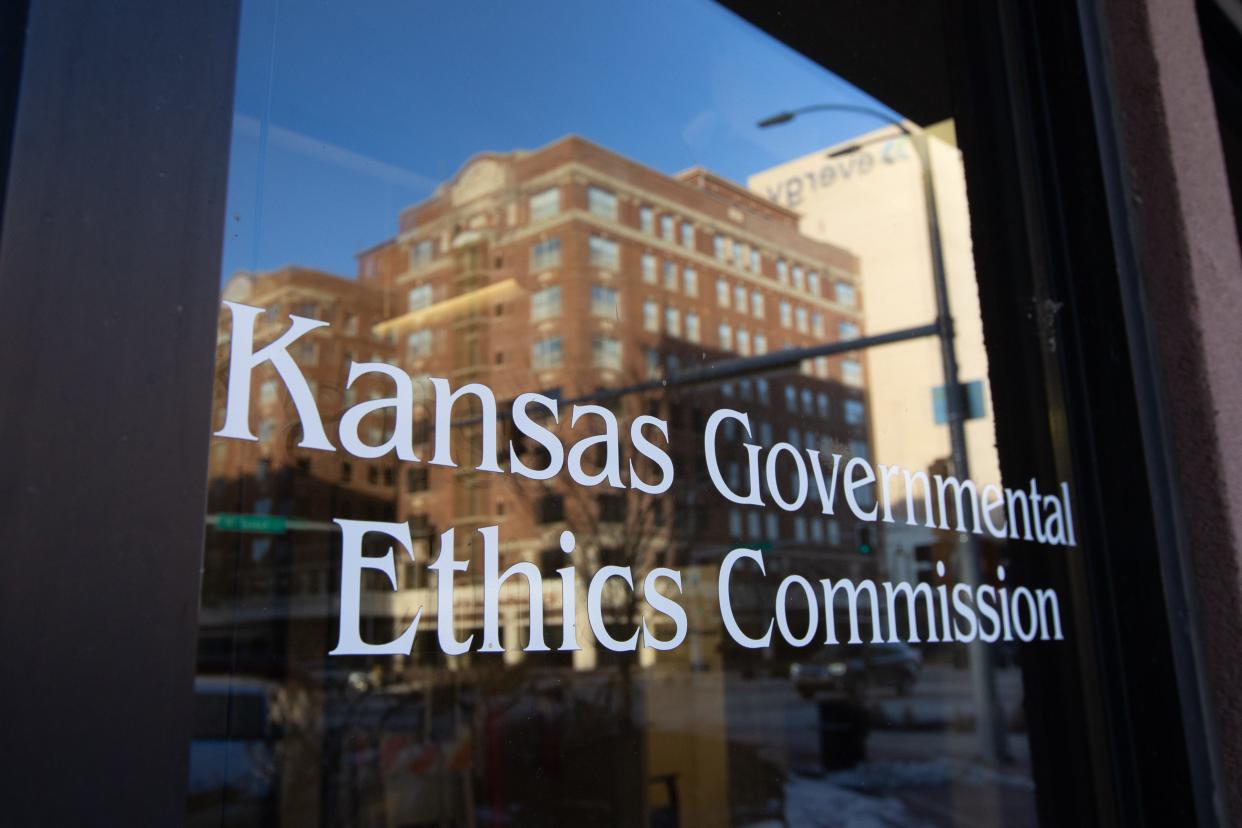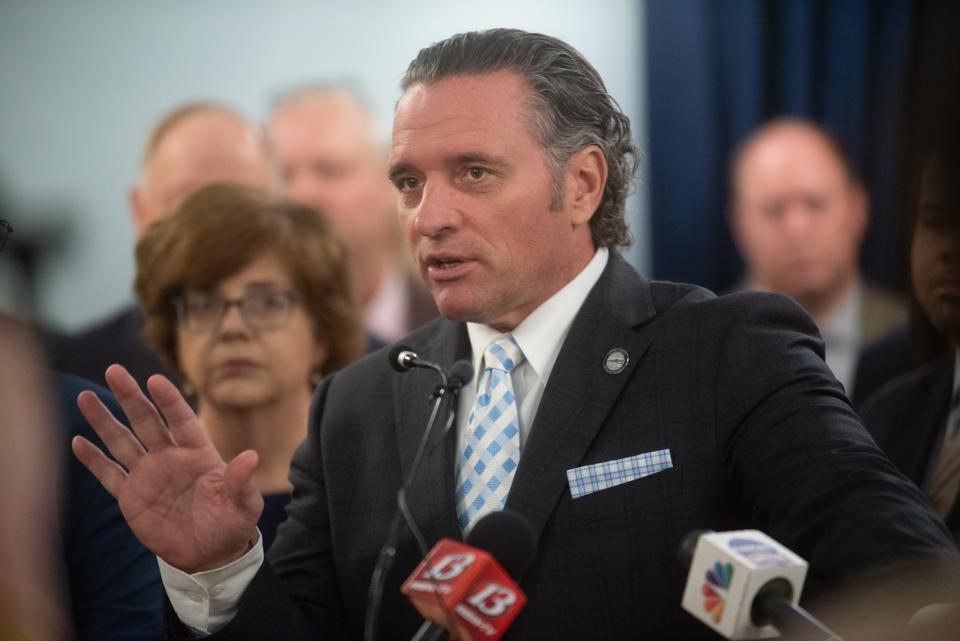Kansas Republicans tried to oust ethics head amid subpoenas. Will they try again?

- Oops!Something went wrong.Please try again later.
In 2022, lawmakers took the rare step of attempting to oust the head of the body that regulates their campaign finance activities.
The move ultimately failed — but it helped shed a light on an ongoing campaign finance probe by the Kansas Governmental Ethics Commission that resulted in subpoenas being issued to prominent interest groups, Republican party officials and lawmakers.
Things have resumed to business as usual in the Statehouse, after the revelations made a shockwave in the waning days of last year's session.
But while the subpoena case has increasingly played out in the open, lawmakers are still saying they are considering a sweeping change to the Ethics Commission's structure, campaign finance law or both.
Senate President Ty Masterson, R-Andover, told reporters earlier this week that he didn't know exactly what the alterations might look like but all but predicted they would be on the agenda at some point.
"I can't imagine we don't revisit it in some way," he said.
Effort could target Ethics Commission structure, requirements to serve
In an interview Wednesday, Mark Skoglund, director of the KGEC, said any legislative move to overhaul the agency could have major consequences.
"Any attempt to undermine the Ethics Commission should and will be viewed by Kansans as a direct shot to their ability to trust governmental decision making," he said, "as well as ethics and transparency in the state of Kansas."
But Masterson was critical of Skoglund's leadership of the commission, echoing concerns from other Republicans.
While lawmakers felt a degree of "comfort" with Skoglund's predecessor, Carol Williams, Masterson said, "There is kind of a 'gotcha' sense now."
"I think there's a sense he's a bit of an activist in the role instead of just trying to keep the trains on the tracks," he said.
Skoglund was firmly in the crosshairs in 2022, when lawmakers sought to require the executive director of the Ethics Commission possess an active law license, something that did not apply to Skoglund at the time.
Republicans said it stemmed from controversy where Skoglund testified during the case of an Overland Park civic group, Fresh Vision OP. Others raised the alarm.
"Last year, that was crazy," said Davis Hammet, executive director of the voter engagement group Loud Light. "Like, out of nowhere, it came up where they were just trying to remove the ethics director really rapidly in such a quick succession. And probably the only reason that didn't happen was because all the reporting on it. That raised public awareness."
A bill has yet to be introduced to launch a renewed overhaul of the Ethics Commission, but there are a few areas likely to be raised.
More:As Kansas Ethics Commission and lawmakers face off, some want changes to key campaign finance law
That includes changing the requirements for who can serve on the commission. Currently individuals are barred from being appointed if they had recently served in elected office or in leadership of a political party and there is talk of loosening those requirements.
The commission's procedures could also be examined, granting an outside entity, such as a judge or the Office of Administrative Hearings, the ability to conduct hearings in a bid to separate out the commission's investigatory powers.
Joshua Ney, a prominent conservative attorney who represented Fresh Vision OP in their case, argued that allowing the Ethics Commission to bring a case and hear it simultaneously represented a gaping flaw in current campaign finance laws.
"I don't want no regulation, I want fair regulation," he said. "The current process is extremely unfair."
'I kind of hope it has a chilling effect'
The battle over the subpoenas has moved from the backroom to the courtroom — and has heated up in recent months.
The Ethics Commission in August went to court in a bid to compel the production of documents from seven individuals, essentially a move to enforce a series of previously issued subpoenas. The individuals targeted include former leaders in local Republican parties in Johnson, Sedgwick and Shawnee counties.
In December, attorneys for the agency took the unusual step of asking a Shawnee County judge to bar the public from watching proceedings and to seal key documents, arguing the publicity could jeopardize the investigation.
More:A battle over subpoenas of Kansas Republican officials is heating up. Here is what's at stake.
But Shawnee County District Court Judge Teresa Watson rejected the request. When combined with a review of court documents, the resulting court hearing gave new insight into the probe.
Brett Berry, attorney for the Ethics Commission, said the agency believes a series of conservative political action committees gave to local Republican parties with the intent of them passing those funds to the statewide GOP in a move to circumvent limits on donations.
Copies of subpoenas show that the investigation was expanded to examine the potential involvement of top Kansas Senate and House lawmakers and staff, other county Republican Party officials and political campaign consultants.
Attorneys for defendants, as well as Republican legislators, have decried the investigation as nothing more than a fishing expedition that would not amount to anything.
But Hammet said it would be problematic if lawmakers pursued any changes to the state's ethics framework while key individuals were under investigation, saying it would be tantamount to obstruction of justice.
"Just seeing the behavior that happened last year should raise some red flags," he said. "If this was just a minor thing or the kind of thing that could be corrected, you would think that they would not try to completely overhaul a system, an agency that has been in place this long and has bipartisan people on it. ... You wouldn't expect that drastic of a reaction if you weren't concerned about what might be exposed."

Masterson disagreed, saying not all lawmakers were under investigation. When asked if a move to consider changes would have a chilling effect on future Ethics Commission probes, Masterson said he thought that effect could be a good thing.
"I kind of hope it has a chilling effect if it's a guilty until proven innocent model and legislators aren't comfortable asking questions," he said. "Yeah, I actually think that's an appropriate response."
Other finance law changes being considered in Kansas
Not all changes to the state's campaign finance infrastructure are expected to be so contentious, however.
Rep. Stephanie Sawyer-Clayton, D-Overland Park, introduced legislation designed to close a loophole that allows groups to send election-related text messages without identifying themselves.
Texts advocating for or against a candidate must include a tagline indicating who paid for their dissemination. But any communications that do not use nine specific phrases expressly urging support for or against a candidate also do not require disclosure of who paid for them.
Meanwhile, constitutional amendments are covered by a different statute and do not contain a disclosure requirement.
Controversy flared ahead of the Aug. 2 primary, when voters were set to weigh in on a measure that would have eroded state constitutional protections for abortion.
The day prior to the election, voters complained of being inundated with misleading text messages that implied a "yes" vote would have supported abortion rights, which was inaccurate. It is believed a group led by former GOP Congressman Tim Huelskamp was behind the messages, which did not disclose a sender.
Sawyer-Clayton's bill would address both loopholes and was a direct response to the primary.
"Characters (in text messages) are limited but, you know what, those characters are important, we should know," she said. "There should be a consistency. If I send out something on a postcard, it has to have a 'paid for by' (attribution)."
Skoglund said the Ethics Commission has long been supportive of broadening the paid for attribution statute.
In the past, the agency has proposed a separate item to embrace language mirroring federal law, which would deem a communication that is reasonably interpreted to urge a vote for or against a candidate to be covered, regardless of the language used.
There appears to be some bipartisan interest in the idea, with Rep. Pat Proctor, R-Fort Leavenworth, chair of the House Elections Committee, saying he would have a hearing on Clayton's proposal next week.
Misleading text messages, he said, eroded voter confidence in elections.
"I am always very reluctant to do anything that touches free speech," Proctor said. "But I really feel like our statutes have not caught up to technology. We need to make clear that when you are engaged in express advocacy in an election that people have the right to know who is making those statements."
But Ney said that while changes to campaign finance law are important, including more specific definitions for what constitutes a political committee, structural changes to improve how the Ethics Commission functions should be paramount.
"I feel like a bipartisan consensus that what everyone thought were the rules on any number of types of topics have been changed (by the commission) over the past few years," Ney said. "And that's patently unfair."
This article originally appeared on Topeka Capital-Journal: Kansas lawmakers to examine changes to ethics body amid subpoenas

